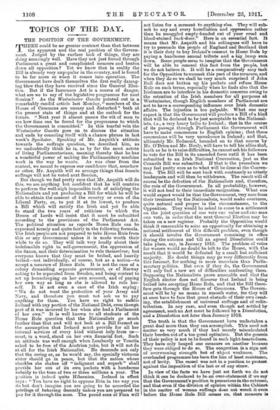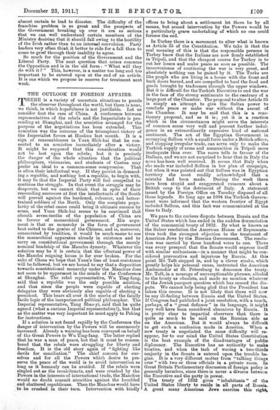TOPICS OF TIlE DAY.
THE POSITION OF THE GOVERNMENT.
THERE could be no greater contrast than that between the apparent and the real position of the Govern- ment. Judged by the surface look of things, they are doing amazingly well. Have they not just forced through Parliament a great and complicated measure and beaten down all opposition? Yet we know that in reality the Bill is already very unpopular in the country, and is bound to be far more so when it comes into operation. The Government have dealt themselves the first really damag- ing blow that they have received since the General Elec- tion. But if the Insurance Act is a source of danger, what are we to say of the legislative programme for next Session? As the Westminster Gazette pointed out in a remarkably candid article last Monday," members of the House of Commons are uneasy and disturbed." both at the present state of things and at the outlook for the future. "Next year it almost passes the wit of man to see how time can be found for the programme to which the Government is committed." In this tearful vein the Westminster Gazette goes on to discuss the situation and ends by consoling itself with a chance phrase in last week's Spectator. Speaking of Mr. Asquith's attitude towards the suffrage question, we described him, as we undoubtedly think he is, as by far the most astute of living Parliamentarians, meaning thereby that he has a wonderful power of making the Parliamentary machine work in the way he wants. As was clear from the context, we meant to express our confidence that, somehow or other, Mr. Asquith will so arrange things that female suffrage will not be voted next Session, But though we feel pretty sure that Mr. Asquith will do this, we are anything but confident that he will contrive to perform the well-nigh impossible task of satisfying the Nationalists and yet producing a Bill for which he will be able to obtain the consent of the country or even of the Liberal Party, or, to put it at its lowest, to produce a Bill which will satisfy the Irish and yet be able to stand the two years of criticism to which the House of Lords will insist that it must be submitted according to the provisions of the Parliament Act. The political situation as regards Home Rule can be expressed tersely and quite fairly in the following formula. The Irish people are not prepared to take Home Rule from this or any Government unless it is made worth their while to do so. They will talk very loudly about their indefeasible right to self-government, the oppression of the Saxon, and their determination to rule themselves; but everyone knows that they must be bribed, and heavily bribed—not individually, of course, but as a nation—to accept a measure of Home Rule. It is not the case of a colony demanding separate government, or of Norway asking to be separated from Sweden, and being content to set up housekeeping on her own account, and of paying her own way as long as she is allowed to rule her- self. It is not even a case of the Irish saying : " We do not want the protection of. your Army and Navy, and therefore you must not ask us to pay anything for them. You have no right to saddle Ireland with any portion of the National Debt, even though part of it was incurred by her when she bad a Parliament of her own." It is well known to all students of the Home Rule question that the Nationalists go much further than that and will not look at a Bill framed on the assumption that Ireland must provide for all her internal services of every kind without help from us— must, in a word, stand on her own financial feet. Such an attitude was well enough when Lombardy or Venetia asked to be free of the Austrian yoke, but it will not do at all for the Irish Nationalist. He demands not only that the erring or, as he would say, the specially virtuous sister should go in peace, but that the nation whose shackles she shakes off " indignant and superb " shall provide her out of its own pockets with a handsome subsidy to the tune of two or three millions a year. The position is indeed quite Hibernian. Ireland in effect says : "You have no right to oppress Erin in the way you do but don't imagine you are going to be accorded the privilege of behaving decently unless you are prepared to pay for it through the nose. The proud sons of Finn will not listen for a moment to anything else. They will sub- mit to any and every humiliation and oppression rather than be smuggled empty-handed out of your cruel and blood-stained back-door." Here is an essential fact. It means that Mr. Asquith and his colleagues will have to try to persuade the people of England and Scotland that it is their duty to buy Ireland's consent to Home Rule by paying a handsome annual tribute and a big lump sum down. Some people seem to imagine that the Government will be able to conceal this fact from the people, but we do not believe it It will be a comparatively easy task for the Opposition to unmask this part of the measure, and when they do so we shall be very much surprised if John Bull does not button up his pockets and refuse Home Rule on such terms, especially when lie finds also that the Irishmen are to interfere in his domestic concerns owing to the retention of the Irish members for all purposes at Westminster, though English members of Parliament are not to have a corresponding influence over Irish domestic affairs. The injustice is too palpable. What one may expect is that the Government will produce a Bill of a kind that will be declared to be just acceptable to the National- ists, i.e., a very heavy bribe to Ireland ; that in the course of its passage through Parliament the Government will have to make concessions to English opinion ; that those concessions will be very unwelcome in Ireland ; and that, ultimately Mr. Redmond, hounded on to that course by Mr. O'Brien and Mr. Healy, will have to tell his allies that, loath as he is to raise difficulties, be cannot ask his followers to vote for the Bill in its amended form until it has been submitted to an Irish National Convention, just as the Councils Bill was submitted. If that is the procedure we may feel pretty sure as to what will be done at the Conven- tion. The Bill will be sent back with contumely as utterly inadequate and will then be withdrawn. The result will of course be the defection of the Nationalists and, therefore, the ruin of the Government. In all probability, however, it will not lead to their immediate resignation. What one would expect would be that the Government, very sore from their treatment by the Nationalists, would make overtures, quite natural and proper in the circumstances, to the Opposition. They would be asked to come to a settlement on the joint question of one vote one value and one scan one vote, in order that the next General Election may be taken on a new register. Probably the Opposition would think it reasonable to seize an opportunity for obtaining a national settlement of this difficult problem, even though it should involve the Government remaining in office during the autumn and till an agreed Dissolution could take place, say, in January 1913. The problem of votes for women would no doubt be left to the House, with the result that it would be defeated by a small but sufficient majority. No doubt things may go very differently from this forecast, for nothing is more uncertain than Parlia- mentary politics. But even if they do, the Government will only find a new set of difficulties confronting them. Supposing the Nationalists prove amenable and that the English elector does not discover that Ireland is being bribed into accepting Home Rule, and that the Bill there- fore gets through the House of Commons. The Govern- ment will be by no means in smooth water, for they will at once have to face that graft obstacle of their own creat- ing, the establishment of universal suffrage and of redis- tribution. In any case, and even though not settled by agreement, such an Act must be followed by a Dissolution, and a Dissolution not later than January 1913.
The truth is that the Government have undertaken a great deal more than they can accomplish. This need not matter so very much if they bad merely miscalculated their burden out of a too great optimism. But the genesis of their policy is not to be found in such light-heartedness. They have only heaped one measure on another because they were obliged to do so. The congestion is a sign not of overweening strength but of abject weakness. The overloaded programme has been the line of least resistance, not of levity. The camel was not in a position to protest against the imposition of the last or of any straw.
In view of the facts we have just set forth we do not think it can be declared to be an over-statement if we say that the Government's position is precarious in the extreme, and that even if the division of opinion within the Cabinet in the matter of woman suffrage does not wreck it even before the Home Rule Bill comes on, that measure is almost certain to lead to disaster. The difficulty of the franchise problem is so great and the prospects of the Government breaking up over it are so serious that we can well understand certain members of the Ministry desiring that it should fall owing to the hostility of the Irish rather than to an internal convulsion. Party leaders very often think it better to ride for a fall than to come to grief through their inability to agree.
. So much for the position of the Government and the Liberal Party. The next question that arises concerns the Opposition and is in the old form : " What will they do with it ? " This, however, is a matter too long and too important to be entered upon at the end of an article. It is one which we propose to reserve for treatment next week.



































 Previous page
Previous page